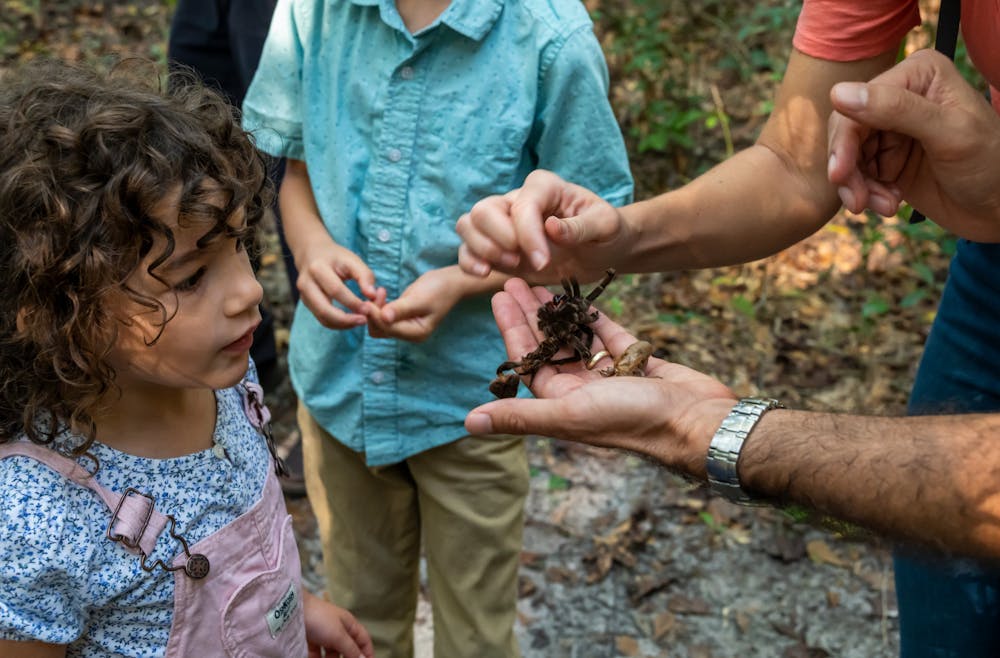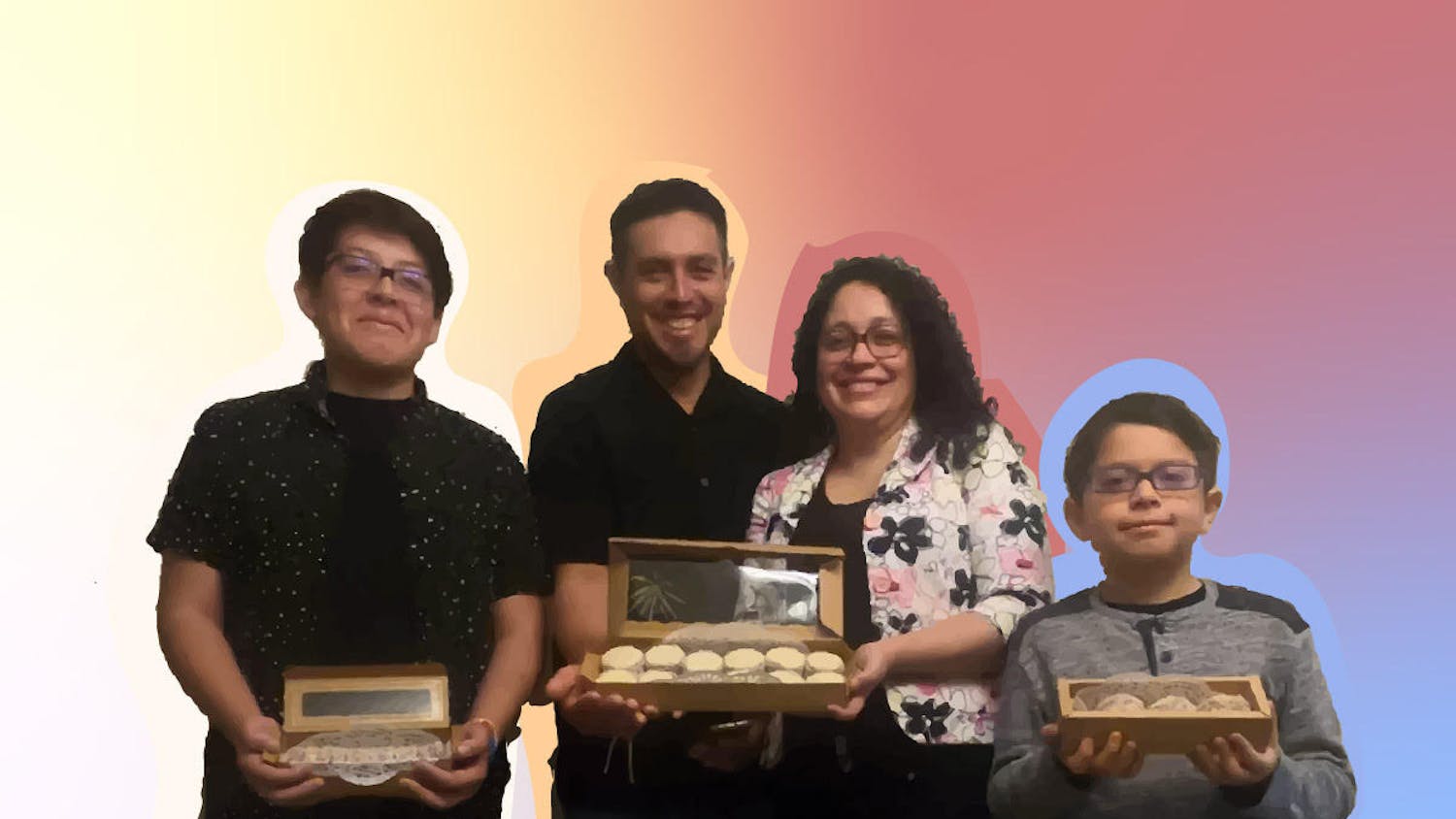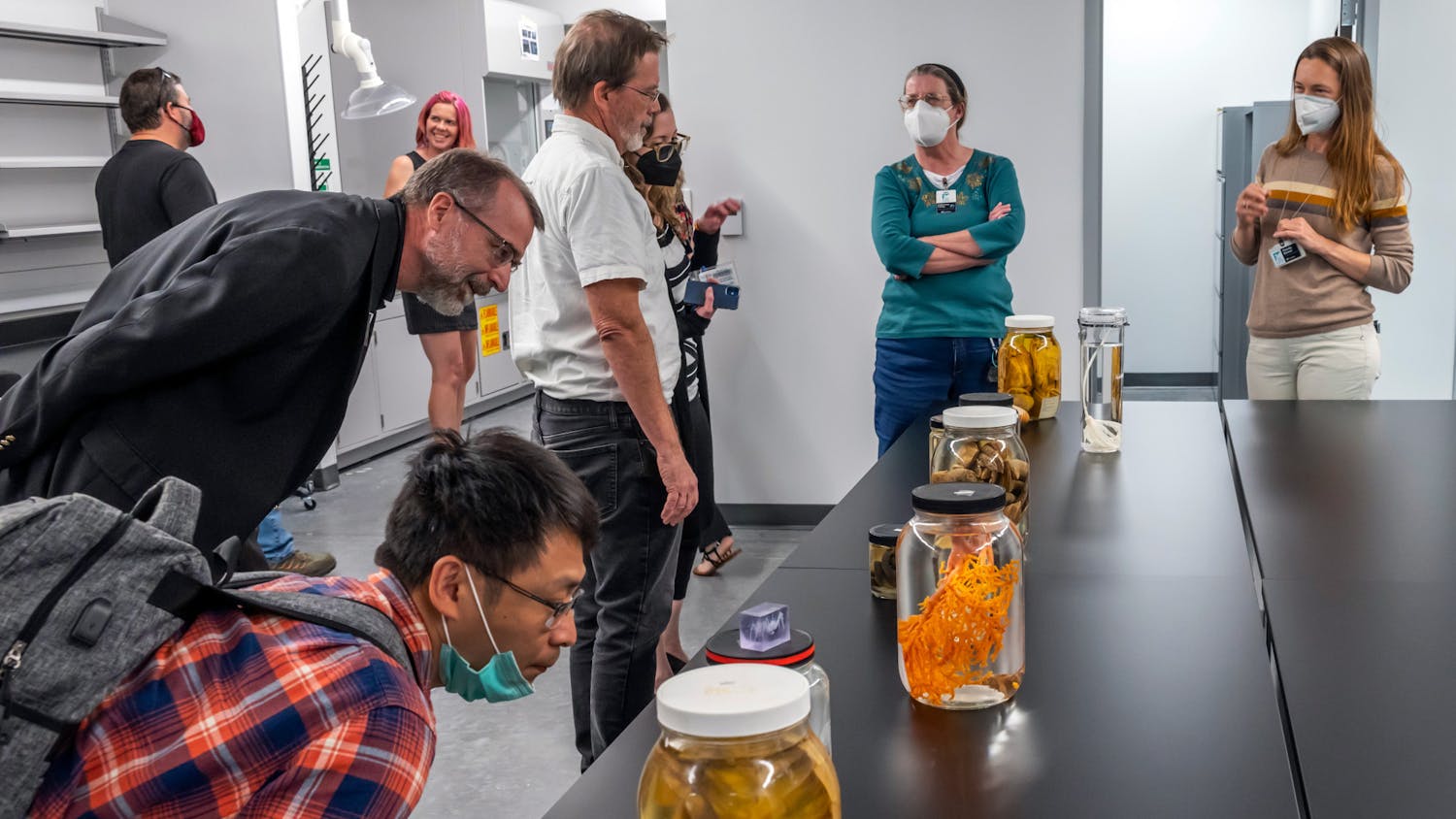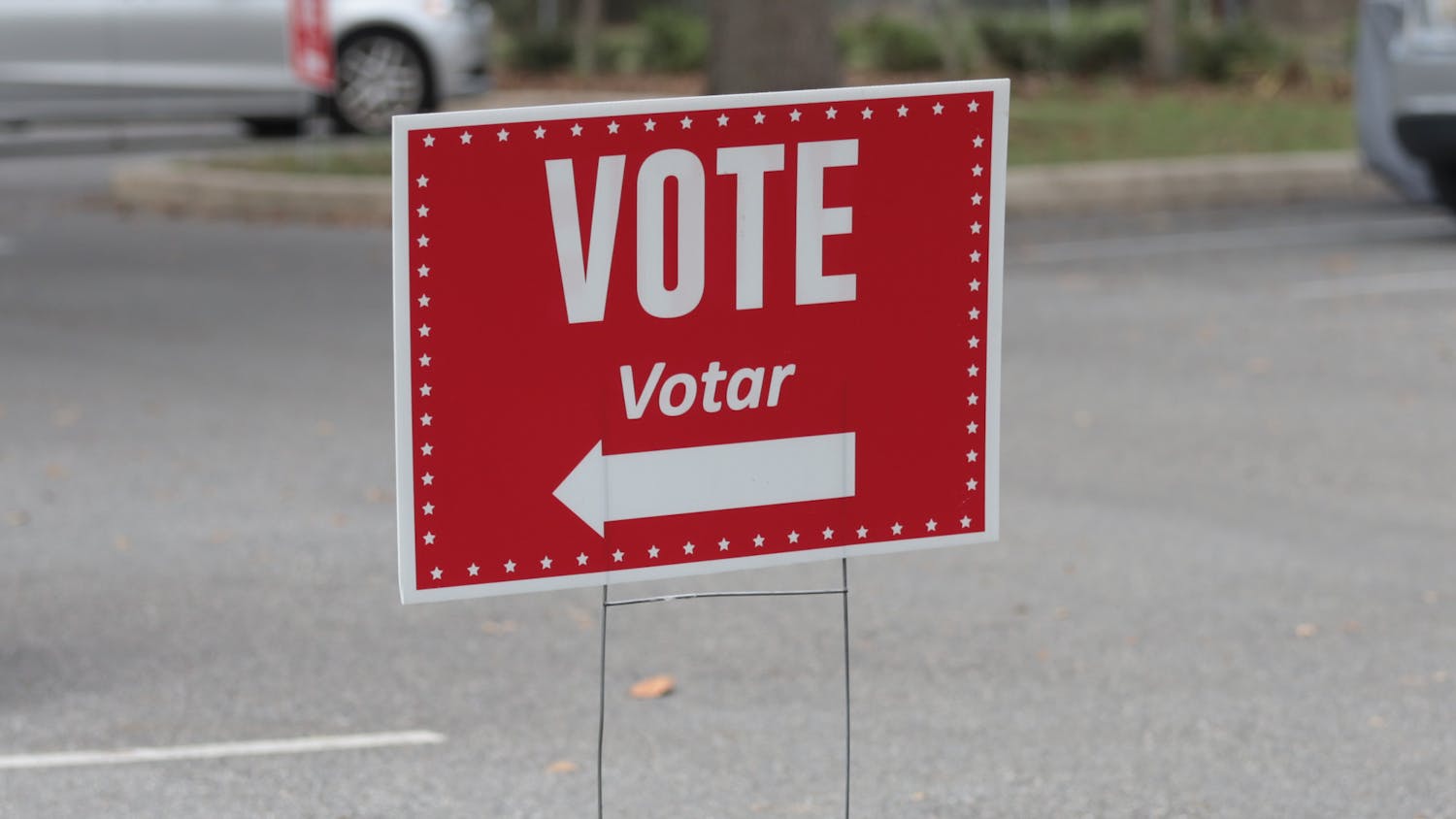Spring in Gainesville's state parks welcomed the vibrant violas, violets and zephyranthes that bloom throughout the lushful wildlife. Children prance through the fields, collecting the colorful flowers.
Afterward, guests of all ages gather to listen to an engaging scientific explanation by scientist Gabriel Somarriba — wishing they brought a notebook to keep track of the fascinating details.
For Somarriba, this is only one experience from the countless memories the Museum in the Parks program has created for him.
“It’s a sense of coming full circle,” he said.
Funded by the Institute of Museum and Library Services, the program is run by the Florida Museum of Natural History in Gainesville and focuses on enhancing children's understanding of and engagement with wildlife by teaching them about topics such as plants, animals and entire ecosystems.
Museum in the Parks happens four times a month, once for every organization that wants to participate including YMCA, Children Beyond Our Borders, Kids Count and Gainesville Parks and Recreation. Each group does different, interactive activities.
Alberto Lopez, 41, is the youth outreach coordinator for the Florida Museum of Natural History. He started Museum in the Parks in 2021 to engage children with limited access to scientific resources, he said.
Lopez’s educational background includes outdoor and indoor programming, as well as expertise working in museums. Looking to pair student interaction with outdoor exploration, he worked on the general concept for the program by pulling from these different experiences.
“How can I combine both worlds?” he said he would ask himself.
It was during 2020, with the sudden rise of the COVID-19 pandemic, when Lopez said he saw there was more urgency to develop outdoor programs.
“I was lucky enough to have this concept already written out, and now I had the perfect moment to launch it,” he said.
Museum in the Parks distinguishes itself from other museum outreach programs, as it’s been built on three fundamental components: Interaction, exploration and application.
The program, first, brings museum collections to the outdoors and into the parks for children to observe firsthand, Lopez said. But the collections aren't the only novelty out in the wild — Lopez also brings the scientists.
“We not only want the kids to see the collections,” he said, “we want the kids to learn about the people who use these collections.”
Gabriel Somarriba, 26, a master's student in the biology department at UF and a member of the museum’s department that deals with the study of fishes, has been a contributing member of Museum in the Parks since the program’s early stages.
When approached by Lopez, Somarriba had no other incentive for doing the program except the idea sounding exciting.
“I just wanted to do it because it sounded like a cool idea,” he said. “I love talking to people.”
Since then, Somarriba said, he’s made an effort to create a memorable experience for the children by catching live fish, setting up water tanks and bringing live specimens for them to observe.
Born in Brazil and living in Mexico before arriving in the U.S., Somarriba has been passionate about wildlife since childhood and resonates with the program’s students, he said.
The kids remind me of myself, he said.
Much of Somarriba’s knowledge and influence stem from reading and watching Animal Planet, he said, and now, he’s proudly passed on this knowledge and influence to aspiring students.
“It’s like walking into a nature documentary,” Somarriba said. “You get that narrator talking to you, directly.”
Lopez and Somarriba both believe the goal of Museum in the Parks is for children to see how scientists’ model and conduct their research out in the field.
“Being outdoors with an expert from a certain field is such a unique thing,” Lopez said.
Interaction with scientists and specimens overlaps into the program’s second element: exploration.
Gainesville resident Catalina Lopez heard about Museum in the Parks through the nonprofit Children Beyond Our Borders and has assisted the events with her husband and two sons, who are 6 and 8 years old.
“The program not only helps people familiarize themselves with the community,” she said, “but also allows them to develop an interest in aspects and investigation of nature.”
Having a realistic, environmental perspective has helped her children cultivate a stronger appreciation for wildlife and for education, Catalina said.
Just recently, Museum in the Parks has placed more emphasis on bilinguality with the program’s curriculum addressed in both English and Spanish.
“A great component of the group is that we get to unite with other Hispanic families,”Catalina said.
Catalina believes that strengthening her childrens’ Spanish is a vital aspect of their development, she said. She admires the program’s ability to not only enhance their scientific knowledge but also their communication skills.
All the written materials as well as interactive videos are bilingual, Alberto Lopez said.
For Children Beyond Our Borders, the program is mostly in Spanish, but for other organizations, live translating is usually done.
“This has helped make these families feel included and breaks down language barriers,” Alberto said. “We also work really hard in trying to get scientists that are bilingual or that are Hispanic, which for many of the kids is great because our scientists become role models for them.”
Gainesville resident Lucy Moreno, 52, and her family have also appreciated the experiences Museum in the Parks has given them to familiarize themselves with the Floridian environment after moving from El Salvador to Alachua County, she said.
“It’s not an enclosed activity, so you have the opportunity to live it,” Moreno said.
Moreno’s husband has several reforestation projects in El Salvador and Nicaragua focusing on climate change. Attending Museum in the Parks has given them another perspective to learn from, she said.
The third element of Museum in the Parks revolves around doing hands-on activities.
Activities like Somarriba’s fish identification memory game helps children familiarize themselves with the concepts they have already learned.
To solidify the hands-on approach, Museum in the Parks has developed the backpack program, a museum partnership program done with the Alachua County Library District.
Every library in Alachua County has a Museum in the Parks backpack — the same backpack used in face-to-face Museum in the Parks interactions. These backpacks have tools that are meant to enhance the experience when they explore their park, their backyard,” Alberto Lopez said.
The tools in these backpacks are items that not many people have at home, Alberto Lopez said.
“It’s a beautiful partnership because they recommend books that are tied to all the different Museum in the Parks themes that we do,” he said. “So, there’s a literacy component as well.”
The backpacks were placed into the libraries in November and have been popular since, said Brad McClenny, 42, public relations and marketing manager at the Alachua County Library District.
“They are on hold almost all the time,” he said.
As summer approaches, they will most likely only grow more popular, McClenny said.
Even for children who are unable to physically attend the program’s interactive sessions, Lopez has created a hybrid version of the activities.
People can attend the parks after checking out the backpacks, and they can assist with video links to all the programs, he said. This includes meeting the scientists virtually and learning different exploration methods.
“I want to provide the same experiences that kids have face-to-face to kids checking out the backpacks at the libraries,” Lopez said.
The program's biggest challenge is funding, but Lopez is determined to expand to other organizations and eventually, other counties, he said.
Lopez and his team also hope to present this program at the Association of Science and Technology Centers, a national conference tailored towards scientific developments.
“Being able to be that person to introduce these kids to these experiences — that’s an amazing feeling,” he said.
Contact Nicole at nbeltran@alligator.org. Follow her on Twitter @nicolebeltg
Nicole Beltran is the Spring 2025 Engagement Managing Editor and a third-year journalism and economics major. She’s worked as the Fall 2025 Senior News Director and caimán editor. In her spare time, Nicole enjoys journaling, sculpting and going for walks.






